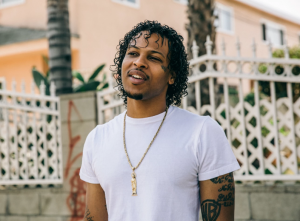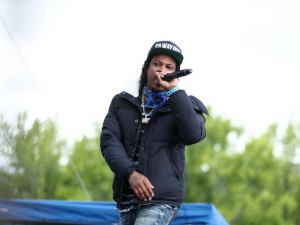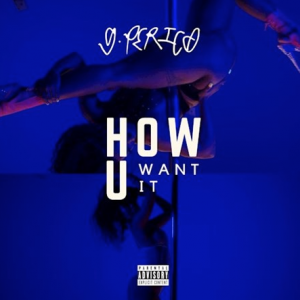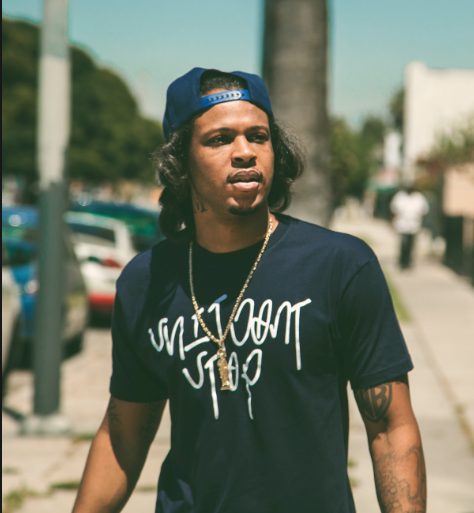In addition to being the city of angels, Los Angeles also is teeming with rap talent and is one of the harbors of the genre’s roots. Rapper G. Perico is well aware of this fact and, armed with his experiences, is trying to take the music to new heights. His new track “How You Want It” is on the latest installment of StripJointsMusic, songs available FOR FREE to strip club DJs!
THE ED PUB: California is rich with rap history—how are you trying to carry the mantle of LA-based rap in this day and age?
 G. PERICO: I’m not necessarily trying to carry it as much as I’m trying to take it to the next level and a place it’s never been before. That’s what everyone in the history books did. It’s up to me to take it to a place it hasn’t been. Some things, maybe, people won’t understand in the beginning, but it takes the music and culture to the next level.
G. PERICO: I’m not necessarily trying to carry it as much as I’m trying to take it to the next level and a place it’s never been before. That’s what everyone in the history books did. It’s up to me to take it to a place it hasn’t been. Some things, maybe, people won’t understand in the beginning, but it takes the music and culture to the next level.
THE ED PUB: Who do you cite as your biggest influences?
GP: There’s so many people that came before that did a great job. I pretty much study everybody. I would say E-40, Jay-Z, Snoop—and their careers are still going. We love longevity and being able to do what we do for life.
THE ED PUB: Have you felt that moment where you looked around the room you’re in and thought to yourself “I made it”? If so, how did that feel and can you describe the room you were in?
 GP: I don’t really think I’ve felt it in a moment at a show or event or video or anywhere where I looked around and got a chance to reflect because everything is still a work in progress, even though I’m doing a million times better than a year ago and two years ago. I have looked back and been like, “Damn, you have grown.” All this is all from rap—why would I stop? So I have moments, but I know I need to keep going.
GP: I don’t really think I’ve felt it in a moment at a show or event or video or anywhere where I looked around and got a chance to reflect because everything is still a work in progress, even though I’m doing a million times better than a year ago and two years ago. I have looked back and been like, “Damn, you have grown.” All this is all from rap—why would I stop? So I have moments, but I know I need to keep going.
THE ED PUB: Is it true your uncle ran an indie record label? If so, how did that shape your career and how much were you able to learn about the music industry through that relationship?
GP: When my uncle was in his hey-day, I was like 5 or 6. I remember a lot, but it’s loose memories. I remember the studio being set up in the backhouse we had behind my grandma’s house and he used to come in and go out with boxes of tapes. I remember hitting weights and him sampling sounds. I actually did kind of clone everything I saw. When I first came in, CDs was going out—it was more a retro thing with vinyl and tapes. I was behind on where the industry was headed but I got my CDs out all across (LA) and that’s something I saw my uncle do, back when they sold tapes and music. His boxes were coming in and getting sold, mine were coming in and going out on the giveaway. I have a couple of studios now because of him having a studio. It helps my work be more potent. Seeing all that subconsciously helped me operate the way I do now.
 THE ED PUB: You’ve talked about how your music can be a positive example—how did you come to the realization your music could offer something more, lyrically speaking? Do you consciously think of that when you’re creating music or does it come about more organically?
THE ED PUB: You’ve talked about how your music can be a positive example—how did you come to the realization your music could offer something more, lyrically speaking? Do you consciously think of that when you’re creating music or does it come about more organically?
GP: When I’m creating, it comes naturally. As for the music, what you take from it can be a catch-22. It could be a positive example—but also, every artist is a walking contradiction. That’s what makes a good artist a great artist. I don’t think people feel one way throughout the whole day or whole week. You go through a gang of different emotions, different thoughts, different ideas. That’s what I do. Me being a human, I can’t be one way but I can just tell my experiences. For a person from the outside looking in that, I guess lives vicariously through others would see what I did, what I talk about but what I went through, the cause and effect—”This is what made me be like this, this is what happened after I was like this and then I had to do something different to be how I am today.” Hopefully, people can learn from my hard lessons and not experience them.





























